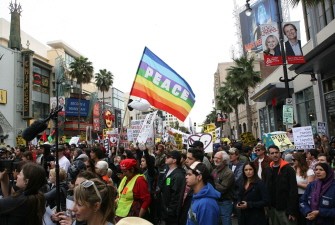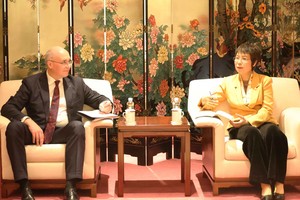LONDON, March 20, 2011 (AFP) - Britain bombarded Libya with missiles from air and sea as multinational forces launched military action, with Prime Minister David Cameron urging an end to Moamer Kadhafi's "appalling brutality".
As the intervention to enforce a UN-mandated no-fly zone began, British Tornado war planes on Saturday hit Libyan military targets with Storm Shadow cruise missiles, Britain's first air strikes in the campaign.

The planes flew 3,000 miles (4,800 kilometres) from their base in eastern England and back again in what officials said was the longest-range bombing mission for the Royal Air Force since the Falklands war with Argentina in 1982.
A British Trafalgar-class submarine meanwhile joined in an attack with American forces from the Mediterranean that saw more than 110 Tomahawk missiles fired at some 20 air defence targets, a top US military officer said.
France -- which with Britain had been leading calls for action in the face of initial US reluctance -- earlier on Saturday started the assault with a series of air strikes following a crisis summit of world powers in Paris.
The international community has moved to put a halt to the advance of Kadhafi's forces on rebels, who have been trying to overthrow the Libyan leader for more than a month.
Speaking in London after rushing back from the Paris summit, Cameron said the action was "necessary, legal and right".
"We have all seen the appalling brutality that Colonel Kadhafi has meted out against his own people and far from introducing the ceasefire he spoke about he has actually stepped up the attacks and the brutality," he said.
Defence Minister Liam Fox said the action signalled that the "international community will not stand by while the Libyan people suffer under the Kadhafi regime."
The air strikes were "the longest range bombing mission conducted by the RAF since the Falklands conflict," he added. The fighter jets were supported by air-to-air refuelling aircraft and surveillance planes, said Fox.
Britain has two frigates, HMS Cumberland and HMS Westminster, already in the Mediterranean.
Tornado and Typhoon fighters are being moved to bases near Libya to bolster the action, which British officials have codenamed "Operation Ellamy".
With the shadow of Britain's involvement in the 2003 invasion of Iraq hanging over him, Cameron went to great lengths to defend the intervention, which is the first time he has sent troops into action since becoming premier.
"It is necessary because, with others, we should be trying to prevent him [Kadhafi] using his military against his own people," he said.
"It is legal, because we have the backing of the United Nations Security Council and also of the Arab League and many others.
"And it is right because we believe we should not stand aside while this dictator murders his own people."
The UN Security Council resolution passed on Thursday authorised the use of "all necessary means" to protect civilians and enforce a ceasefire and no-fly zone against Kadhafi's forces.
The intervention is backed by Arab states and several European nations, including Belgium, the Netherlands, Denmark and Norway, have confirmed their will to take part.
The Libyan government declared a ceasefire after the resolution was passed, but the rebels say Kadhafi's forces have continued to bombard their strongholds.
























